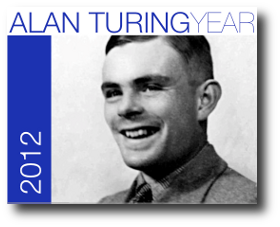
LATA - Language and Automata Theory and Applications. The 6th International Conference on Language and Automata Theory and Applications, March 5-9, 2012, A Coruña, Spain.

LATA - Language and Automata Theory and Applications. The 6th International Conference on Language and Automata Theory and Applications, March 5-9, 2012, A Coruña, Spain.
The history of LATA starts in 2007. After three consecutive editions organized in Tarragona, the 4th edition (LATA 2010) took place in Trier, Germany while the 5th edition was back in Tarragona. Now it is the time for a new place to host LATA 2012, this time we go to A Coruña, Galicia, Spain.
LATA 2012
Research Group on Mathematical Linguistics
Rovira i Virgili University
Av. Catalunya, 35
43002 Tarragona, Spain
Phone: +34-977-559543
Fax: +34-977-558386
e-Mail: florentinalilica.voicu (at) urv.cat

A centenary celebration of the life and work of Alan Turing. The tutorial sessions Around the Physical Church-Turing Thesis presented by Gilles Dowek on March 6 and 7 are dedicated to this event.
The volume of proceedings published by Springer in the series of Lecture Notes in Computer Science ( LNCS volume 7183) will be available by the time of the conference.
 |

|
| Event announced: July 16, 2011 |
| Paper submission: October 12, 2011 (23:59h, CET) |
| Notification of paper acceptance or rejection: November 21, 2011 |
| Final version of the paper for the LNCS proceedings: November 28, 2011 |
| Early registration: December 5, 2011 |
| Late registration: February 24, 2012 |
| Starting of the conference: March 5, 2012 |
| Submission to the post-conference special issue: June 22, 2012 |
The following events are taking place in Tarragona. TPNC2012, October 1-5, 2012, WSMBio2012, February 20-24, 2012, WSLST2012, January 23-27, 2012, FSFLA2011, October 31 - November 4, 2011 .
|
|

|
(alphabetically ordered)
| 1) | Parosh Abdulla, Mohamed Faouzi Atig, and Jari Stenman. The Minimal Cost Reachability Problem in Priced Timed Pushdown Systems |
| 2) | Siva Anantharaman, Chris Bouchard, Paliath Narendran, and Michael Rusinowitch. Unification modulo Chaining |
| 3) | Vikraman Arvind and Yadu Vasudev. Isomorphism Testing of Boolean Functions Computable by Constant-Depth Circuits |
| 4) | Mikhail Barash and Alexander Okhotin. Defining Contexts in Context-free Grammars |
| 5) | Philip Bille, Inge Li Gørtz, and Jesper Kristensen. Longest Common Extensions via Fingerprinting |
| 6) | Philip Bille and Morten Stöckel. Fast and Cache-Oblivious Dynamic Programming with Local Dependencies |
| 7) | Holger Bock Axelsen. Reversible Multi-Head Finite Automata Characterize Reversible Logarithmic Space |
| 8) | Beate Bollig and Tobias Pröger. An Efficient Implicit OBDD-Based Algorithm for Maximal Matchings |
| 9) | Laura Bozzelli. Strong Termination for Gap-order Constraint Abstractions of Counter Systems |
| 10) | Julien Cervelle. Covering Space in the Besicovitch Topology |
| 11) | Gabriel Ciobanu and G. Michele Pinna. Catalytic Petri Nets are Turing Complete |
| 12) | Alberto Dennunzio, Enrico Formenti, and Julien Provillard. Complexity of Non-Uniform Cellular Automata |
| 13) | Danny Dubé, Mario Latendresse, and Pascal Tesson. Conservative Groupoids Recognize only Regular Languages |
| 14) | Michal Forisek, Lucia Keller, and Monika Steinová. Advice Complexity of Online Coloring for Paths |
| 15) | Travis Gagie, Pawel Gawrychowski, and Simon J. Puglisi. A Faster Grammar-Based Self-Index |
| 16) | Ziyuan Gao and Frank Stephan. Learnability of Co-r.e. Classes |
| 17) | Viliam Geffert, Bruno Guillon, and Giovanni Pighizzini. Two-Way Automata Making Choices Only at the Endmarkers |
| 18) | Michael Geilke and Sandra Zilles. Polynomial-Time Algorithms for Learning Typed Pattern Languages |
| 19) | Daniela Genova. Forbidding Sets and Normal Forms for Language-Forbidding-Enforcing Systems |
| 20) | Stefan Hetzl. Applying Tree Languages in Proof Theory |
| 21) | Dag Hovland. The Membership Problem for Regular Expressions with Unordered Concatenation and Numerical Constraints |
| 22) | Norbert Hundeshagen and Friedrich Otto. Characterizing the Rational Functions by Restarting Transducers |
| 23) | Oscar Ibarra and Nicholas Tran. Weak Synchronization and Synchronizability of Multitape Pushdown Automata and Turing Machines |
| 24) | Hadrien Jeanne, Jean-Marc Champarnaud, and Ludovic Mignot. Approximate Regular Expressions and their Derivatives |
| 25) | Ahmet Kara, Thomas Schwentick, and Tony Tan. Feasible Automata for Two-Variable Logic with Successor on Data Words |
| 26) | Miroslav Klimoš, Kim Guldstrand Larsen, Filip Štefaňák, and Jeppe Thaarup. Nash Equilibria in Concurrent Priced Games |
| 27) | Alexander Krassovitskiy and Peter Leupold. Computing by Observing Insertion |
| 28) | Withdrawn |
| 29) | Arne Meier, Johannes Schmidt, Michael Thomas, and Heribert Vollmer. On the Parameterized Complexity of Default Logic and Autoepistemic Logic |
| 30) | Alexei Miasnikov and Zoran Sunic. Cayley Automatic Groups are not Necessarily Cayley Biautomatic |
| 31) | Ðurica Nikolić and Fausto Spoto. Automaton-based Array Initialization Analysis |
| 32) | Mathilde Noual. Dynamics of Circuits and Intersecting Circuits |
| 33) | Mateus De Oliveira Oliveira. Canonizable Partial Order Generators |
| 34) | Max Rabkin. Ogden's Lemma for ET0L Languages |
| 35) | Daniel Reidenbach and Markus Schmid. Patterns with Bounded Treewidth |
| 36) | Adam Roman. P–NP threshold for Synchronizing Road Coloring |
| 37) | Eric Rowland and Jeffrey Shallit. k-Automatic Sets of Rational Numbers |
| 38) | Ville Salo and Ilkka Törmä. On Stable and Unstable Limit Sets of Finite Families of Cellular Automata |
| 39) | Nguyen Van Tang and Hitoshi Ohsaki. On Model Checking for Visibly Pushdown Automata |
| 40) | Adam Woryna. Automaton Ranks of some Self-similar Groups |
| 41) | Tomoyuki Yamakami. One-Way Reversible and Quantum Finite Automata with Advice |
| 42) | Ryo Yoshinaka. Integration of the Dual Approaches in the Distributional Learning of Context-Free Grammars |